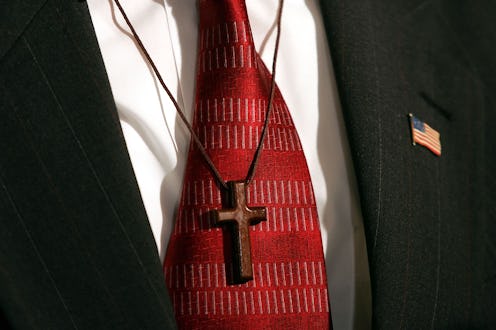
Mass shootings in America aren't unique or rare occurrences. Since the beginning of 2017, shootings have been taking place nearly every day according to data aggregated and researched by the Gun Violence Archive. To put it in cold numbers, that's over 270 shootings since the start of the year. The reaction to these incidents is also almost formulaic at this point: send your thoughts and prayers. But people in the country are beginning to see that prayers alone won't put an end to shootings.
Authorities reported that at least 26 people had been killed after a gunman opened fire on a church congregation on Sunday noon in Sutherland Springs, Texas. In a tweet shared shortly after the shooting, one person on Twitter responded to House Speaker Paul Ryan's tweet which said, "Reports out of Texas are devastating. The people of Sutherland Springs need our prayers right now." The Twitter user under the handle of @ZeddRebel retweeted Ryan and said, "It was a church. They had the prayers covered. What they needed was a [government] that loves people more than NRA money."
Minutes after local reports gained national coverage, political figures like Trump's daughter and advisor Ivanka, Texas Sen. Ted Cruz, and Texas Gov. Greg Abbott issued their initial statements and indeed did send their "thoughts and prayers" to the victims.
The president of the United States, too, invoked God and said, "May God be [with] the people of Sutherland Springs, Texas. The FBI [and] law enforcement are on the scene. I am monitoring the situation from Japan." Some noticed that Trump's reaction to the church shooting was much different than his response to the recent terror attack in New York City on Oct. 31.
The prayers-only approach has recently become a significant point of contention, especially because gun control is such an incredibly divisive subject in the United States. According to the Pew Research Center, more than half of the country demands stricter gun control laws. Some observers have begun using social media to remind lawmakers of their supposed complicity in the nation's seemingly unending shooting epidemic.
Other Twitter users have brought up past statements from political officials. In response to Abbott's prayers tweet, one Twitter user dug up a 2015 tweet from the governor that encouraged Texans to buy more guns. "I'm EMBARRASSED," Abbott tweeted in 2015, "Texas #2 in nation for new gun purchases, behind CALIFORNIA. Let's pick up the pace Texans."
Some have juxtaposed officials' platitudes next to their legislative efforts. In another instance, Los Angeles Times contributing writer Jamil Smith tweeted, "'Thoughts and prayers,' from the Texas attorney general who sues to end gun bans in city halls and courthouses."
With these tweets in mind, the common sentiment seems to be extreme disappointment. Instead of pushing for legislative efforts to address gun violence, some lawmakers are making what come across as hollow statements. And it isn't just civilians who feel this way. Political figures like Connecticut Sen. Chris Murphy have told Congress to "get off its ass and do something."
The bromide nature of "thoughts and prayers" becomes most evident in the case of church shootings like that in Sutherland Springs, Texas, where, like Twitter user @ZeddRebel noted, the act of praying is already "covered" by worshippers. What people need now, some Americans would argue, is material change in the form of reform or control. Not just spiritual support.
It's worth remembering that the manner in which politicians respond to a tragedy is never neutral, and that includes sending thoughts and prayers. What public officials say — or don't — in the first 24 hours after the crisis helps define the official response to the incident and indicates lawmakers' primary concerns. Offering prayers is a thoughtful gesture, but it can't achieve systematic change alone. And it looks as if a lot of Americans are sick and tired of it.